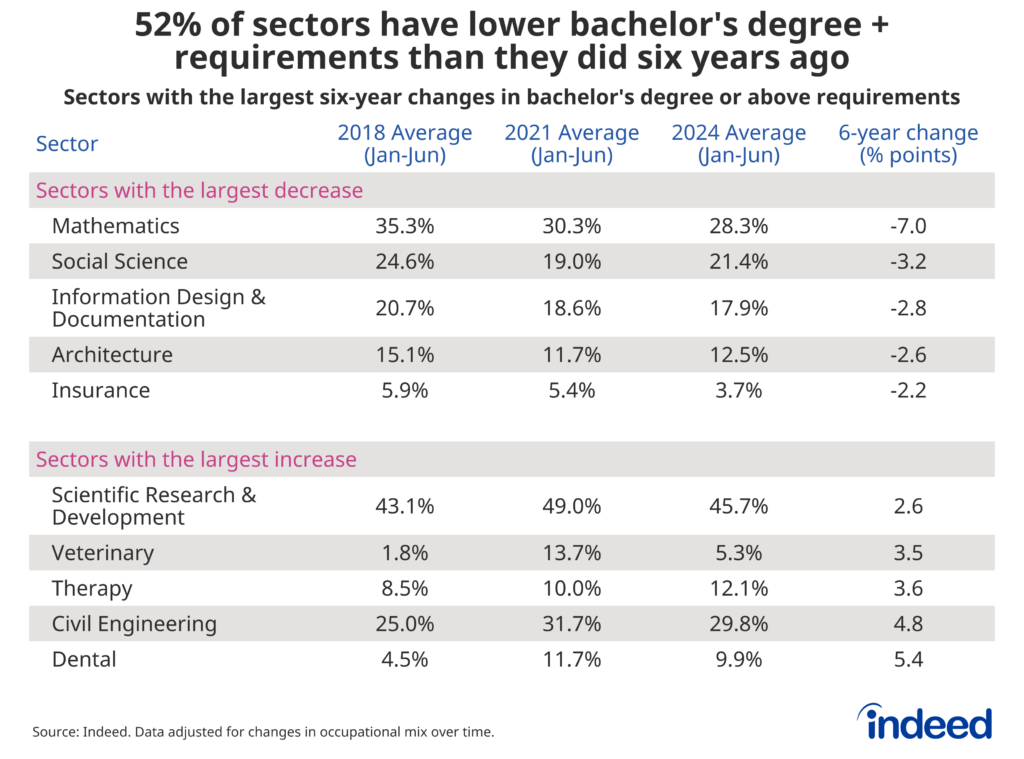Key points:
- Only about 14% of UK job postings explicitly mention any kind of formal educational requirements, compared to almost 50% in the United States.
- The overall share of UK postings requiring a university degree has remained stable over the past five years but has declined in some high-skill, knowledge-intensive occupations.
- Roles in sectors in which a higher share of postings demand an advanced degree remain better compensated than those with lower educational requirements.
On the surface, the share of UK job postings that explicitly mention a formal education requirement is both surprisingly low and remarkably stable; unlike the much higher and more consistently declining share found in the United States. In a still-tight labour environment marked by persistent skills shortages in certain sectors, the data offer some evidence of a growing focus on skills-based hiring practices, especially in some high-skill, knowledge-intensive occupations.
The percentage of job postings in the United Kingdom that explicitly require a Bachelor’s or more advanced degree has remained steady at around 4.6% for several years. Over roughly the same time the share of U.S. postings with similar requirements has noticeably declined, from 20.4% in January 2019 to 17.8% by January 2024. In the United Kingdom, just under 1% of postings mention the need for a Master’s or doctoral degree, while another 3.7% specifically require a Bachelor’s diploma. Despite the tight labour market conditions in recent years, employers’ preference for these education credentials has remained stable.
Why is the share of jobs requiring a university degree this low? For one, many UK employers might already practise skills-based hiring, in which an emphasis is placed on a candidate’s demonstrated mastery of the skills required of a job, and not solely on possession of a degree proxy for those skills. Skills-based hiring has been more common lately — and likely, more necessary — in numerous tech-adjacent occupations for which dedicated university degrees are being developed but which still tend to lag behind the skills required at the technological frontier.
Second, Brits have relatively high educational attainment rates compared to the average across countries in the Organisation for Economic Cooperation & Development (OECD). In 2022, a small majority of the UK population (51%) had a tertiary degree (OECD average: 40%), and 30% had an upper secondary or post-secondary (non-tertiary) degree. This implies that for certain high-skill occupations, the candidate pool very likely already contains a good amount of university-educated individuals, and employers do not feel as compelled to stress the need for a degree in their postings.
Finally, job postings may not mention a specific level of required education because it is implied by the nature of the job itself; in many highly regulated professions — including doctors, nurses, or lawyers — a degree is a necessity. Additionally, if a job posting references a professional licence — such as the Construction Skills Certifications Scheme required for many construction roles — that licence itself may require a particular educational qualification. This analysis is unlikely to capture that kind of formal education requirement if it is not explicitly mentioned. But even in unregulated professions, job postings in the UK aren’t especially likely to explicitly require a formal degree, which may well be a simple cultural peculiarity unique to the UK compared to other advanced economies, including the US.
The majority (86.2%) of UK job postings do not mention any educational requirement at all, a share that has also stayed consistent over the past five years. Only a small percentage (3.7%) mention GCSE exams or an equivalent, and even fewer — around 1% — explicitly require A-levels or up to a foundation degree. About one in twenty require some level of National Vocational Qualification (NVQ).
Employers also often mention multiple education requirements in one posting, such as when they might prefer a specific level of education but are willing to consider applications from candidates without it. In these cases, this analysis uses the lowest education requirement mentioned.
Degree requirements have fallen in highly paid, technical occupations
The types of educational requirements mentioned explicitly in job postings vary widely by occupation. The job categories most likely to mention tertiary credentials (i.e., anything between a foundation and doctoral degree) are scientific research and development (45.7% of postings in this field require this level of education), civil engineering (30.1%), mathematics (28.6%), and social science (21.5%). NVQs are most likely to appear in beauty & wellness (51.4% of postings in that category), pharmacy (28.9%), installation & maintenance postings (19.2%), and personal care and home health (18%), where specialised, non-university training is required.
Postings in occupations including driving, cleaning, and food preparation & service rarely explicitly mention educational requirements. In these fields, training is typically done on the job, and/or required skills are demonstrated through the acquisition of specialised licences (like a driving licence). Furthermore, certain sectors — even those generally expected to and/or legally required to demand a university degree — often don’t specify one. This is the case for physicians & surgeons, for example.
A small number of high-skill, technical occupations — some of which are on the UK skilled worker visa list, and for which employers have a real incentive to move to skills-based hiring — have experienced a more notable decline in education requirements over the past six years. In mathematics, which includes data science, the share of postings requiring a minimum of a bachelor’s degree fell from 35.3% in the first half of 2018 to 28.3% in the first half of this year, a decline of seven percentage points. In the social science and information design & documentation fields, the decrease was around three percentage points over the same period. The field of information design & documentation includes data analysts, business analysts, and consultants. As a result, candidates currently without a degree could have a higher chance of obtaining a job in these sectors than before the pandemic. In contrast, architecture and insurance jobs, which also saw some decline in requirements, are typically subject to regulation, and so a licence instead of a degree is likely the primary requirement mentioned in postings.
On the other hand, job postings today are more likely to contain education requirements in the dental, civil engineering, therapy, veterinary, and scientific research and development sectors than six years ago. Most of these may be considered regulated professions, where a shift from degree-based to skills-based hiring is legally restricted. At the aggregate level, these developments contribute to the stable trend observed above.

Typical salaries across sectors with education requirements show that education pays off
Still, education levels play an essential role in employers’ ability to gauge the skill level of potential candidates. They are also an important credential that demonstrates time invested in obtaining the degree, signalling ambition, reliability, and the ability to bring a project to fruition. Higher levels of education are thus associated with higher pay.
In the top five sectors requiring A-levels or below, job postings mention median annual salaries from £24,813 in administrative assistance up to £27,773 in IT operations & helpdesk. As a comparison, the UK median annual salary was £34,963 in April 2023. Categories more likely to state an hourly wage — such as childcare (£11.71) or production & manufacturing (£12.64) — pay, on average, slightly or moderately above the National Living Wage of £11.44.
The five occupational sectors most likely to require an NVQ pay, on average, between £33,155 (installation and maintenance) and £43,475 (pharmacy) per year, or between £12.13 and £12.34 per hour.
For the top five sectors mentioning tertiary education credentials (foundation degree or above), the average salaries specified in Indeed postings in 2024 ranged between £38,620 for scientific research & development jobs and £44,349 for jobs in social science.
Conclusion
UK employers may often implicitly expect candidates to have attained certain education levels, even without explicitly mentioning them in job postings. To ensure the right candidates are targeted by the posting, it may be more useful for employers to spell out whether a degree is actually needed or if it could be replaced by adequate experience and/or demonstrated skill mastery. Considering that the UK labour supply remains tight in certain sectors of the economy, a move to skills-first hiring could help extend candidate pools.
Many UK employers do not tend to state an education requirement at all; for jobseekers without a degree, this may imply that they have a chance at obtaining a job in unregulated professions. And in a small number of occupations, degrees do appear to have lost importance, suggesting a shift to skills-based hiring at least in some pockets of the labour market. Finally, Indeed salary data shows that education pays off: Sectors with higher education requirements typically have better pay.
Methodology
We tracked educational requirements by tallying UK job postings on Indeed that mentioned one or more degree or training requirements in the job description as of June 30, 2024. Data is not adjusted for seasonality but is adjusted for changes in job title mix by weighting according to 2024 composition (January-June average). In cases where multiple requirements were mentioned, the lowest was used. Analysis shows that the share of jobs with multiple requirements typically fluctuates between 1 – 3% in any given month.
NVQs cover several levels and may be considered equivalent to GCSE (level 2), A-levels (level 3), Certificates of Higher Education (level 4), Foundation degree (level 5), or a Bachelor’s degree (level 6). Our measure combines all levels, but a review of our data shows that most job postings mentioning a level of NVQ require level 2 or 3. The NVQ is thus considered the “lowest education level mentioned” if a posting mentioned an NVQ in addition to a Foundation degree or higher, while for postings mentioning both GCSE or A-level exams and an NVQ, the former credentials are considered the lower qualification.
The salary tables do not show average salaries of jobs requiring a certain degree, but the average posted salary across the entire occupational sector.


